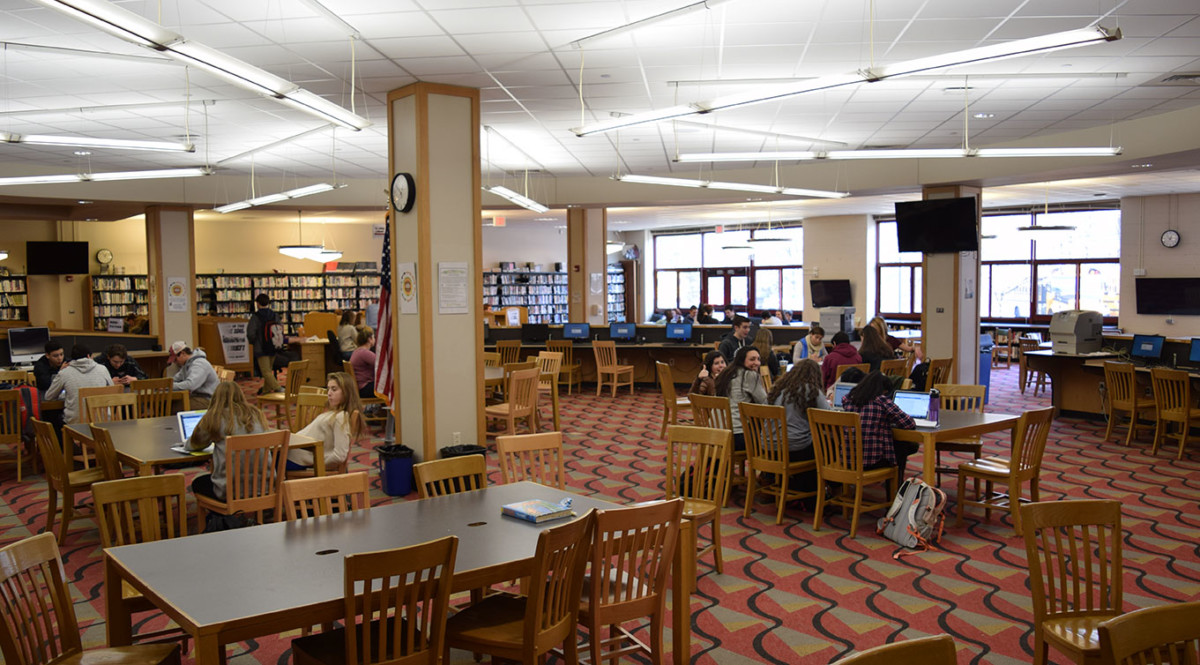On the Tuesday following midterms, librarians Michelle Luhtala and Jackie Whiting sent an email to NCHS students and staff regarding the new policies in the library. In the email, which was the result of seventeen drafts, Ms. Luhtala and Ms. Whiting explained that the library has been a source of pride for the school. A great deal of time, effort, and money went into creating such a comfortable and accessible space for students to study, demonstrated through the purchase of lounge furniture, implementation of the Makerspace, and allowance of food in the upper library.
With the accumulation of these privileges, however, the library staff feel that students have “lost sight of the kind of behavior that makes such privileges possible” and have used the library purely for socializing rather than learning. Since the library’s main purpose is to serve as a “community learning space,” Ms. Luhtala and Ms. Whiting felt the need to restore this purpose in response to the shift in library culture. This means requiring that students have work in front of them at all times, keeping the lower library a place for quiet study, and scanning student IDs to monitor who is in the library at any given time.
Almost immediately after the library staff sent the email, a torrent of complaint and confusion enveloped the school. Students shared their criticisms with each other and on social media, some going as far as outwardly attacking the library staff and the new changes. With the new library system, students feel that the ID check-in system and the strict management of traffic flow with the “wall” separating the north and south ramps of the library upon entrance is excessive and inefficient. Students who have always used the library as a quiet place for studying feel as though they are being punished or hassled when it should really be the students who don’t use the library respectfully. But most of the backlash is over library staff’s intent to shift the focus back to learning. Since the library is where most people go during their free periods, students feel that a social atmosphere should exist and be encouraged as a break from class and schoolwork. Others understand the librarians’ intentions, but feel that some of the functions in the library, like video game software in the computers, discourages a work-only environment.
In this debate, many students fail to realize the severity of disrespect and abuse of privileges that occurred when the library staff was more lenient. In the lower library (excluding the quiet section), very little studying or schoolwork was being completed. It instead became a place where students were shouting and talking loudly, leaving food and trash, and even throwing pencils like darts so they stuck into the ceiling tiles. It isn’t Ms. Luhtala and Ms. Whiting’s job to be cleaning up after us during lunch block, or repeatedly asking students to quiet down and removing them from the library when they don’t. Even as they did this and asked students to stop, students would say rude things back to them or ignore them altogether.
First of all, it should never be acceptable to be rude to someone else, especially if they are librarians whose priority is to help you. Second, as students of a learning community, we are so lucky to have the library staff as resources to help us succeed in our high school while preparing us for our future after graduation. Frankly, it is understandable for the librarians to want to curb the rudeness and promote studying so they can actually help us with our papers and projects instead of chasing after students who misbehave. And, for those students who still want to socialize and be loud, there is always the Lounge.
That being said, we do have a couple solutions for the library staff to maintain their original idea of creating a learning space while also appeasing student criticisms. In order to make the library the most effective environment for learning, they could get rid of distractors like the video game software temporarily. In addition to this, some features of the new system, such as the strict rule of eight chairs to a table and only being able to enter the library on the South side is moving towards the library staff having too much control over the students, and should be eliminated too. Even the ID scanning system seems a bit pointless, considering that the librarians don’t need a list of students in the library to kick someone out; they should just do away with it and save the hassle.
In the end, it makes sense to re-establish a library culture based around learning and respect. We must remember we have only one library, and it’s really the only space we have for studying and learning outside of the classrooms. And, on the bright side, if we can demonstrate a new and improved attitude toward the library and maintain it, then the privileges could come back.




